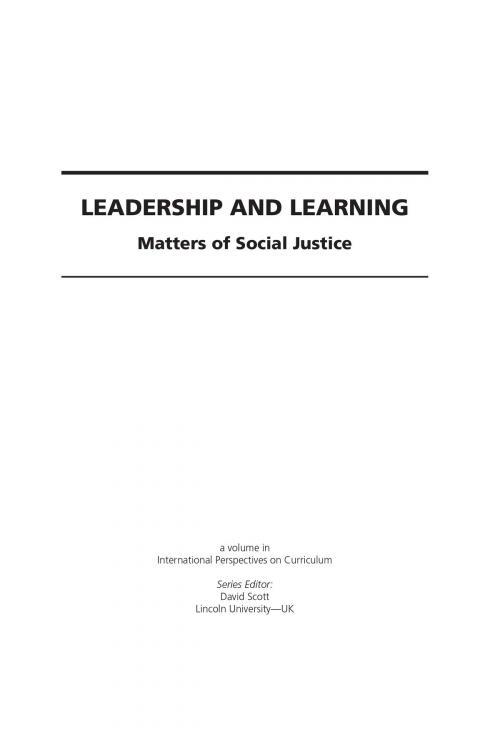Leadership and Learning
Matters of Social Justice
Nonfiction, Reference & Language, Education & Teaching, Educational Theory, Leadership, Administration| Author: | Marlene Morrison | ISBN: | 9781607522171 |
| Publisher: | Information Age Publishing | Publication: | July 1, 2009 |
| Imprint: | Information Age Publishing | Language: | English |
| Author: | Marlene Morrison |
| ISBN: | 9781607522171 |
| Publisher: | Information Age Publishing |
| Publication: | July 1, 2009 |
| Imprint: | Information Age Publishing |
| Language: | English |
This proposal is for a book about pedagogical leadership that draws upon an extensive literature base as well as empirical research by the author in order to examine forms of leadership and management that promote and instill education for learning and social justice. Its starting points are to restore and elevate social and moral purpose in leadership as firstorder constructs that have theoretical and practical implications for existing and potential leader educators. This is not necessarily an easy thing to do. Asking educators and researchers of education leadership to define what they consider to be the core moral values underpinning leadership in educational settings usually results in some fairly bland, if fundamentally important statements about putting learners at the heart of leadership praxis, especially that which occurs in educational settings. In practice, numerous organisational mission statements attest to this rhetorical conviction. Yet, it is current policy contexts that place relations between leaders, teachers, and learners in contradictory ‘moral’ positions. Drives to improve student performance through increased competition in the marketplace, intensified procedures for monitoring and evaluation, and frenetic commitments to ‘change’ as overarching leadership mantras have relegated Sergiovanni’s (1998) definition of pedagogical leadership ‘that invests in capacity building by developing social and academic capital for students and intellectual capital for teachers’ as second, even third order constructs. This book intends to reverse the process and in doing so, it will relegate to second order, and by lively debate and illustrative vignettes, many, though not all of the hegemonic constructs that are prevalent in current ‘managerial’ times. This book will therefore define and challenge a paradox; as governments express commitment to an educational settlement that minimises exclusion, widens participation, and promotes ‘active’ citizenship, the much heralded vanguards of that settlement leaders and managers are being enjoined to reduce their thinking and action to technicist ‘manoeuvres’ (Grace, 2000:236) in which aspirations towards social justice can become more distant, strangely exotic even in their expression. As importantly, such technical manoeuvring is not accompanied by a reduction in leadership and management tasks and responsibilities. As more is demanded of organizations and their leaders in terms of responsibilities for learning in areas of health, sexuality, drug awareness, physical exercise and nutrition, citizenship, work experience, race equality, and skills in familial and social caring, questions arise about the extent to which ‘social justice’ constitutes a wide umbrella under which such interests might ‘shelter’ or whether social justice is to be considered ‘separately’ with attendant dangers to be seen as addon and therefore potentially marginalized or distinct from the total enterprise that constitutes education and learning.
This proposal is for a book about pedagogical leadership that draws upon an extensive literature base as well as empirical research by the author in order to examine forms of leadership and management that promote and instill education for learning and social justice. Its starting points are to restore and elevate social and moral purpose in leadership as firstorder constructs that have theoretical and practical implications for existing and potential leader educators. This is not necessarily an easy thing to do. Asking educators and researchers of education leadership to define what they consider to be the core moral values underpinning leadership in educational settings usually results in some fairly bland, if fundamentally important statements about putting learners at the heart of leadership praxis, especially that which occurs in educational settings. In practice, numerous organisational mission statements attest to this rhetorical conviction. Yet, it is current policy contexts that place relations between leaders, teachers, and learners in contradictory ‘moral’ positions. Drives to improve student performance through increased competition in the marketplace, intensified procedures for monitoring and evaluation, and frenetic commitments to ‘change’ as overarching leadership mantras have relegated Sergiovanni’s (1998) definition of pedagogical leadership ‘that invests in capacity building by developing social and academic capital for students and intellectual capital for teachers’ as second, even third order constructs. This book intends to reverse the process and in doing so, it will relegate to second order, and by lively debate and illustrative vignettes, many, though not all of the hegemonic constructs that are prevalent in current ‘managerial’ times. This book will therefore define and challenge a paradox; as governments express commitment to an educational settlement that minimises exclusion, widens participation, and promotes ‘active’ citizenship, the much heralded vanguards of that settlement leaders and managers are being enjoined to reduce their thinking and action to technicist ‘manoeuvres’ (Grace, 2000:236) in which aspirations towards social justice can become more distant, strangely exotic even in their expression. As importantly, such technical manoeuvring is not accompanied by a reduction in leadership and management tasks and responsibilities. As more is demanded of organizations and their leaders in terms of responsibilities for learning in areas of health, sexuality, drug awareness, physical exercise and nutrition, citizenship, work experience, race equality, and skills in familial and social caring, questions arise about the extent to which ‘social justice’ constitutes a wide umbrella under which such interests might ‘shelter’ or whether social justice is to be considered ‘separately’ with attendant dangers to be seen as addon and therefore potentially marginalized or distinct from the total enterprise that constitutes education and learning.















